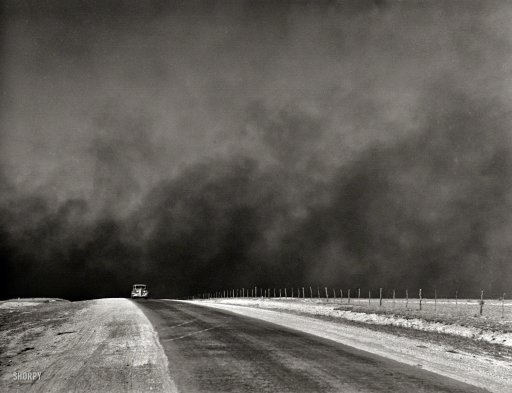
Arthur Rothstein Texas Panhandle Dust Bowl Mar 1936

Vinatage Jim. “I’m not aware that George Washington, Thomas Jefferson, James Madison, or Andrew Jackson put their slaves in a blind trust after they became president.”
• The Cheeto Cometh (Jim Kunstler)
I dunno about you, but I rather enjoy watching the praetorian Deep State go batshit crazy as the day of Trump’s apotheosis approacheth. I imagine a lot of men and women running down the halls of Langley and the Pentagon and a hundred other secret operational redoubts with their hair on fire, wondering how on earth they can neutralize the fucker in the four days remaining. What’s left in their trick-bag? Bake a poison cheesecake for the inaugural lunch? CIA Chief John Brennan has been reduced to blowing raspberries at the incoming president. Maybe some code cowboys In the Utah NSA fortress can find a way to crash all the markets on Friday as an inauguration present. What does it take? A few strategic HFT spoofs? There will be lots of police sharpshooters on the DC rooftops that day. What might go wrong?
Civil War Two is underway, with an interesting echo of Civil War One: Trump dissed Civil Rights sacred icon Georgia congressman John Lewis, descendant of slaves, after said icon castigated Trump as “not a legitimate president.” That now prompts a congressional walk-out of the swearing-in ceremony. The New York Times is acting like a Manhattan socialite in a divorce proceeding, with fresh hysterics every day, reminding readers in a front-page story on Monday that “[Martin Luther] King’s birthday falls within days of the birthdays of two Confederate generals, Robert E. Lee and Stonewall Jackson.” Jeez! Who you gonna call? Ghostbusters? There’s not much Trump can do until Friday noon except tweet out his tweets, but one can’t help but wonder what the Deep State can do after that magic moment passes.
I’ve maintained for nearly a year that, if elected, Trump would be removed by a coup d’état within sixty days of assuming office, and I still think that’s a pretty good call — though I hope it doesn’t come to that, of course. My view of this was only confirmed by Trump’s performance at last week’s press conference, which seemed, shall we say, a little light on presidential decorum. Perhaps it befits this particular Deep State to go down in the manner of an opéra bouffe. History repeats itself, first as tragedy, then as farce, old Karl Marx observed. What does the Union stand for this time? The rights of former SEC employees to sell their services to CitiBank? The rights of competing pharma companies to jack the price of insulin up from $20 to $250 a vial? The rights of DIA subcontractors to sell Semtex plastic explosives to the “moderate” jihadis of the Middle East?
So the theme of the moment is that Donald Trump is a bigger crook than the servants and vassals of the Deep State. He ran for president so he could sell more steaks and whiskey under the Trump brand. He’s in violation of the emoluments clause in the constitution. Well, I’m not aware that George Washington, Thomas Jefferson, James Madison, or Andrew Jackson put their slaves in a blind trust after they became president. Anyway, at this point in our history, nobody can beat the Deep State for financial turpitude, certainly not a single real estate and hotel magnate.

Is this an invitation to double down? Because something tells me it might just work.
• Donald Trump Must Stop Cheering For Brexit, Says Top EU Official (Pol.)
US President-elect Donald Trump’s praise for Brexit and cheerleading for further divisions between European states are unacceptable, a top EU official said Monday. “Having an [U.S.] administration that hopes for the dismantling of Europe is simply not possible,” Pierre Moscovici, European commissioner for economic and financial affairs, taxation and customs, told reporters in Paris. “I don’t accept this vision of things, and I don’t think that comments which in some way glorify the division of the [European] Union, including by predicting further departures, is the best thing for Euro-Atlantic relations.” He added: “I expect from President Trump that he will be at Europe’s side in this strong relationship. I hope we will not always have to debate in this fashion.”
Moscovici was reacting to a joint interview that Trump gave to the U.K.’s Times and Germany’s Bild in which the president-elect called Brexit a “great thing” and said he expected that other EU peoples would also seek to assert their identity. He also repeated his assertion that the NATO military alliance was “obsolete,” and that he wanted the United States to sign a bilateral trade deal with Britain. Moscovici retorted that no free trade deal between the United States and Britain was conceivable until Brexit actually happened. “Even in the case of a hard Brexit, this will take plenty of time,” he said, adding: “We would expect our American partners not to rejoice over this [Brexit].”

Abolish NATO, the EU, and the CIA. And abolish Schumer while you’re at it. That was ONE DUMB remark. And he’s the Democrats’ Senate leader? Boy, they have problems.
“Let me tell you: You take on the intelligence community, they have six ways from Sunday at getting back at you. For a practical, supposedly hard-nosed businessman, he’s being really dumb to do this.”
“Schumer is saying that the CIA is so powerful that a president should not attempt to control it or else!”
Every American who looks at the CIA objectively or in a balanced way and judges it by any number of criteria, such as moral, legal and pragmatic, should reach the conclusion that the CIA should be abolished. JFK wanted to break it into a million pieces. Trump is right to dismiss its intelligence reports about DNC hacking. The CIA war on Trump shows us immediately that the CIA is a rogue organization within the U.S. government and a severe threat to America. The CIA is an internal threat to the rule of law and to the government that it supposedly serves. Senator Schumer acknowledges the CIA’s unbridled power, its subversive power, its power to undermine even a president, especially one that wishes to control or alter the organization, when he says:
“Let me tell you: You take on the intelligence community, they have six ways from Sunday at getting back at you. For a practical, supposedly hard-nosed businessman, he’s being really dumb to do this.” Schumer is saying that the CIA is so powerful that a president should not attempt to control it or else! The CIA is so powerful that elections do not matter when it comes to the CIA. The CIA stands alone. The Constitution that empowers the president as the Executive, the boss of government operations, does not matter. Basic American institutions and laws must bow before the threats that the CIA possesses. This is the assessment of a Senator beginning his 4th term and who is the highest ranking Democrat in the Senate in his post as minority leader.
The CIA is an organization that perpetually undermines traditional American values and moral values. It consistently kills innocent people. It continually causes instability and wars. It undermines other societies and our own. It interferes constantly in foreign nations, to the detriment of them and us. It is an unelected power that challenges elected officials. It favors abuses of power, including torture. Its actual value at generating usable intelligence is minimal, often wrong, often misleading, inaccurate and harmful as in the WMD that were never found in Iraq.

Britain is incapable of conducting a grown up discussion on Brexit. Makes me fearful.
• Theresa May To Confirm UK Exit From EU Single Market (G.)
Theresa May is expected to use the most important speech of her premiership to confirm that Britain will be leaving the single market while insisting that it wants to remain “the best friend” to European partners. In remarks that critics will cite as evidence that the government is pursuing a hard Brexit, the prime minister will set out 12 key priorities for the EU negotiations, with no compromise over the ability to control borders and regain sovereignty. Speaking to an audience at Lancaster House, Westminster, including ambassadors from across the world, May will stress her ambition to reach out beyond the continent to build new trading relationships in a move that suggests the UK will also leave the customs union.
However, the prime minister is likely to restate an argument that she does not see it as an either/or choice and say that whatever final deal on trade and customs duties is struck, lorries will be able to pass through Dover and other ports unhindered, despite warnings from others on the issue. “We seek a new and equal partnership – between an independent, self-governing, global Britain and our friends and allies in the EU. Not partial membership of the European Union, associate membership of the European Union or anything that leaves us half-in, half-out,” May is expected to say. “We do not seek to adopt a model already enjoyed by other countries. We do not seek to hold on to bits of membership as we leave. The United Kingdom is leaving the European Union. My job is to get the right deal for Britain as we do.”

To wit. The guy who said it of course should have been fired right away, but these days such comments are fully acceptable.
• Corbyn Labeled Russian ‘Collaborator’ for Questioning NATO Troop Build-Up (I’C)
The leader of the UK’s Labour Party, Jeremy Corbyn, called for a “de-escalation” of tensions between NATO and Russia, adding in a BBC interview on Thursday: “I want to see a de-militarisation of the border between them.” Along with the U.S., the UK has been rapidly building up its military presence in the Baltic region, including states which border Russia, and is now about to send another 800 troops to Estonia, 500 of which will be permanently based. In response, Russia has moved its own troops within its country near those borders, causing serious military tensions to rise among multiple nuclear-armed powers. Throughout 2016, the Russian and U.S. militaries have engaged in increasingly provocative and aggressive maneuvers against one another. This week, the U.S. began deploying 4,000 troops to Poland, “the biggest deployment of US troops in Europe since the end of the cold war.”
It was in this context that Corbyn said it is “unfortunate that troops have gone up to the border on both sides,” adding that “he wanted to see better relations between Russia, NATO and the EU.” The Labour leader explained that while Russia has engaged in serious human rights abuses both domestically and in Syria, there must be a “better relationships between both sides . . . there cannot be a return to a Cold War mentality.” The response to Corbyn’s call for better relations and de-escalation of tensions with Moscow was swift and predictable. The armed forces minister for Britain’s right-wing government, Mike Penning, accused Corbyn of being a collaborator with the Kremlin:
“These comments suggest that the Labour leader would rather collaborate with Russian aggression than mutually support Britain’s Nato allies. As with Trident, everything Labour says and does shows that they cannot be trusted with Britain’s national security.” This is the same propagandistic formulation that has been used for decades in the west to equate opposition to militarism with some form of disloyalty or treason: if you oppose military confrontation with a foreign adversary or advocate better relations with it, then you are accused of harboring secret sympathy and even support for those foreign leaders, and are often suspected of being an active “collaborator” with (or “stooge” for) them.

Obviously, worth every penny of his salary. Razor-sharp analysis.
• Carney: UK Rates Could Rise Or Fall (BBC)
UK households have continued spending strongly since the referendum, but face headwinds this year, Bank of England governor Mark Carney has warned. Consumers appeared to be “entirely looking through Brexit-related uncertainties”, he said in a speech at the London School of Economics. However, Mr Carney again warned that consumer spending could be hit by rising prices from the weaker pound. He also sounded a cautionary note on the growth in household debt. Mr Carney said that in the year to November, total household borrowing had risen 4%, while consumer credit had gone up by more than 10%, ” the fastest rate since 2005″. Increasingly, the UK was relying on consumer spending for economic growth – rather than exports or investment – which boded poorly for the future, Mr Carney said on Monday.
Gerard Lyons, a UK economist who backed Brexit, said Mr Carney “did rightly highlight the extent to which growth has become more consumer led”. The UK had one of the world’s fastest-growing advanced economies last year, but the Bank of England has forecast growth will slow in 2017 as higher inflation weighs on consumer spending. “We do see a slowing in the economy and household spending this year… that’s a slowing, not a stopping,” he emphasised. Economic forecasters have predicted that inflation could rise above the Bank’s 2% target as a result of the pound’s weakness since the Brexit vote. Sterling fell against most major currencies on Monday as markets anticipated that Prime Minister Theresa May would use a major speech on Tuesday to advocate a so-called “hard Brexit” in which the UK would leave the EU’s single market and customs union. The UK was entering a “period of somewhat higher consumer price inflation”, Mr Carney said. As a result, the next interest rate move could be either up or down, he said.

By its own people. Brilliant! And people claim Le Pen doesn’t stand a chance.
• France Is The Least-Trusted Country In The World (CNBC)
France has claimed the position of the country least trusted by its people, according to an influential survey by the world’s largest public relations firm. A thumping 72% of the French population agree that the institutional system is failing them, placing the country in joint last position alongside neighboring Italy, according to the 2017 Edelman Trust Barometer. Immigration, globalization and eroding social values are highlighted as underpinning the negative results, revealing a disheartening sentiment ahead of this spring’s French presidential election.
The research warns of the consequences playing out in both France and other countries where public disillusion is heightened. “Countries that combine a lack of faith in the system with deep societal fears, such as France, Italy, South Africa, the U.S. and Mexico, are electing or moving towards populist candidates,” reads the research. The disappointment also extends beyond the least enfranchised to the better-off elements of French society. While only a very weak 38% of the mass population trust institutions in France, a mere 56% of the category described as the ‘informed public’ still maintains its faith in the same institutions.

Don’t worry, the big boys rescued their own: “Only the top 10% of revenue generators may get a bonus for 2016..”
• Deutsche Bank Holding Back 90% Of Bonuses This Year (NYP)
Deutsche Bank, the former Wall Street powerhouse, may hold back on giving out bonuses to as many as 90% of bankers and traders, The Post has learned. Only the top 10% of revenue generators may get a bonus for 2016 — and even then it will be paid out over the next five years, according to a source briefed on internal discussions. The bonus plans are still in discussion, another source cautioned, and could still change in the coming weeks. Deutsche was hit hard last month when it settled a mortgage bond probe with the Justice Department for $7.2 billion — which was only about half of what the government initially wanted. While reports have suggested that the settlement could affect the bank’s ability to pay bonuses, it couldn’t be confirmed if the bank had used incentive compensation for the settlement. This wouldn’t be the first time that John Cryan, Deutsche’s CEO, has cut bonuses since taking over in 2014. Last year, the bank cut the bonus pool by 11% and delayed paying its employees until March.

And just to make sure, they’ll print and borrow it. Can’t miss. AKA fake news.
• China To Target Around 6.5% Growth In 2017 (R.)
China will lower its 2017 economic growth target to around 6.5% from last year’s 6.5-7%, policy sources said, reinforcing a policy shift from supporting growth to pushing reforms to contain debt and housing risks. The proposed target was endorsed by top leaders at the closed-door Central Economic Work Conference in mid-December, according to four sources with knowledge of the meeting outcome. “The target will be around 6.5%, which indicates that slightly slower growth is acceptable,” said one of the sources, a policy adviser. The world’s second-largest economy likely grew around 6.7% last year – roughly in the middle of the government’s target range – but it faces increasing uncertainties in 2017, the head of China’s state planning agency said on Jan. 10.
Policy stimulus measures – evident in record lending from mostly state-owned banks and increased government spending – have fueled worries among top leaders about high debt levels and an overheating housing market that could threaten financial stability if not addressed, the sources said. Under the central bank’s recently announced “prudent and neutral” stance, it is expected to guide market interest rates higher to help put the brakes on flush credit conditions, which should also support the weakening yuan CNY=CFXS, the sources said. “They’ve put more emphasis on controlling risks, and monetary policy could be a bit tighter,” said a second policy source, though he characterized the change as ‘fine-tuning’ ahead of a key party meeting in the autumn at which there will be a change in the top leadership. “They are keen to keep economic growth stable before the 19th party congress,” the source said.

How to get 6.5% growth.
• China’s Found a New Way to Pump Record Credit (BBG)
China is increasingly managing the flow of credit with more finely-tuned instruments than its old method of changing how much of their deposits lenders must keep locked away. Banks’ required reserve requirements haven’t changed for almost a year. Instead, the central bank has used short-term lending channels to add almost six times as much funding than would have been added by lowering banks’ RRRs by half a percentage point. With the new tool playing its part in stabilizing the economy – data Friday is estimated to show a 6.7% expansion for 2016 – the People’s Bank of China is switching its focus to risk management. Another advantage of targeted lending: it adds funds without signaling broad easing that adds to downward pressure on the yuan and fuels further capital flight.
The PBOC pumped in a net 270 billion yuan ($39 billion) through open-market operations on Tuesday, the most in a year, data compiled by Bloomberg show. That followed last week’s 305.5 billion yuan of MLF operations, the main short-term lending tool used to meet banks’ medium-term cash demand. Analysts said the efforts can help stabilize liquidity before the week-long Chinese New Year holiday at the end of this month. The PBOC increased the total outstanding of its Medium-term Lending Facility last month to a record 3.46 trillion yuan. That compares with the 600 billion yuan that economists estimate was added to the banking system after the last required reserve ratio cut in February, when it was lowered by half a%age point. Bank deposits stood at 155 trillion yuan in December, greater than U.S. GDP.
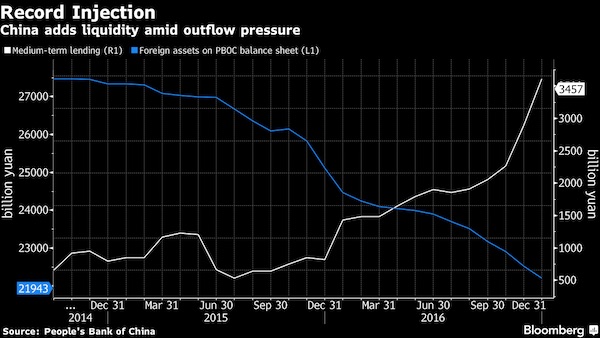

And now imagine a large devaluation of the yuan vs the dollar.
• China’s Oil Collapse Is Unintentionally Helping OPEC (BBG)
OPEC’s campaign to prop up oil prices is getting unlikely support from its biggest customer. China’s production is forecast to fall by as much as 7% this year, extending a record decline in 2016, according to analysts at CLSA, Sanford C. Bernstein and Nomura. That’s about the same size as the output cut agreed by Iraq, the second-biggest producer in OPEC, which late last year reached a deal to trim supply to support prices. “China’s domestic crude output decline will certainly help OPEC’s plan to reduce global supply,” said Nelson Wang, a Hong Kong-based oil and gas analyst at CLSA, who sees a 7% slide this year. ”Even if that isn’t China’s intention, it’s just the reality that China can’t produce more under the current circumstances.” While China consumes more oil than almost any other country, it’s also one of the world’s biggest producers, with fields stretching from offshore its southern coast to the far north east.
The collapse in prices that began in 2014 is taking its toll, and the nation’s output suffered a record decline last year. That plays into the hands of OPEC as it seeks to prop up the global oil market, forcing China to depend more heavily on imports. Brent crude, benchmark for half of the world’s oil, averaged about $45 a barrel last year, more than 50% below levels in 2014, the year OPEC decided to tackle a global glut by keeping the taps open. The crash in prices triggered a rethink by the group, which banded together with 11 non-member countries late last year and agreed to a collective cut of almost 1.8 million barrels a day. Prices have since rallied above $58 a barrel. China’s output slumped in 2016 as state-owned firms shut wells at mature fields that had become too costly to operate after the crash. Crude production fell 6.9% in the first 11 months of 2016 to about 4 million barrels a day, the first decline since 2009 and the biggest in data going back to 1990.
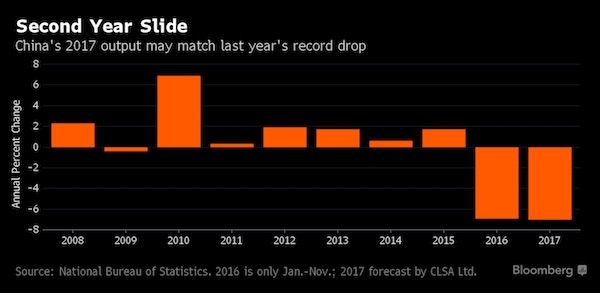

Very interesting discussion, but I would want to see a much stronger link to the pros and cons of centralization itself.
• Size Matters – No Country Should Be Bigger Than This (Mises Inst.)
For Mises, individuals associate with each other voluntarily in order to take advantage of the division of labor. Writing in Human Action, Mises notes: “Every step by which an individual substitutes concerted action for isolated action results in an immediate and recognizable improvement in his conditions. The advantages derived from peaceful cooperation and division of labor are universal. They immediately benefit every generation, and not only Iater descendants. For what the individual must sacrifice for the sake of society he is amply compensated by greater advantages. His sacrifice is only apparent and temporary; he foregoes a smaller gain in order to reap a greater one later.” Mises continues: [H]uman action itself tends toward cooperation and association; man becomes a social being not in sacrificing his own concerns for the sake of a mythical Moloch, society, but in aiming at an improvement in his own welfare.”
In Mises’s view, these efforts to enhance trade and cooperation among human beings lead to the creation of cities and other population centers. Moreover, for Mises, the state — properly limited to the function of protecting private property — can potentially assist in creating conditions that facilitate the cooperative behavior he envisioned. Thus, it is the cost of acting as an administrator of law that leads Mises to conclude that certain “compelling technical considerations” are are likely to keep states above a certain minimum size. A problem arises, however, when we recognize that this vision of the state exists in tension with the fact that — as illustrated by Raico — the physical and geographical growth of states tends to facilitate the expansion of state power well beyond the role imagined by Mises.
When contained at a municipal or metropolitan level, state power is one thing. Relocation to a neighboring metropolitan area remains relatively easy. Once states begin to take control of sizable frontiers and multiple municipal areas, however, the situation becomes far different, and states begin to limit and regulate trade and free movement, rather than facilitate it. Thus, even if we accept Mises’s idea that there is some level at which economies of scale for state administration may be beneficial, those assumed benefits are increasingly threatened the larger a state becomes. The answer lies in limiting state size to a human scale in which human beings can still associate, travel, and trade across jurisdictional boundaries without incurring a great cost. The standard for “great cost” is subjective, of course, and over time has changed substantially.
The cost of traveling 50 miles in the 16th century, for example, is significantly different form the cost of traveling the same distance today. There are ongoing attempts by geographers, however, to determine the “natural” size of a region that encompasses a population’s economic, political, and social institutions. In a recent study, for example, Garret Dash Nelson and Alasdair Rae attempted to identify regions that “have been substantively tied together by the forces of urban development, telecommunications, the frictionless circulation of capital, and the consolidation of both public and private institutions.” Basing their standard of scale on tolerance for commute times, the geographers selected 50-mile commutes as an indicator of how closely tied together is a specific region. The end result was this:
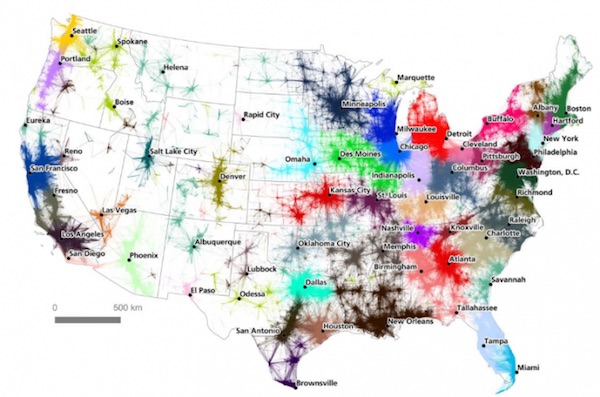
The authors then create a suggested map of political units based on the scale of megaregions:
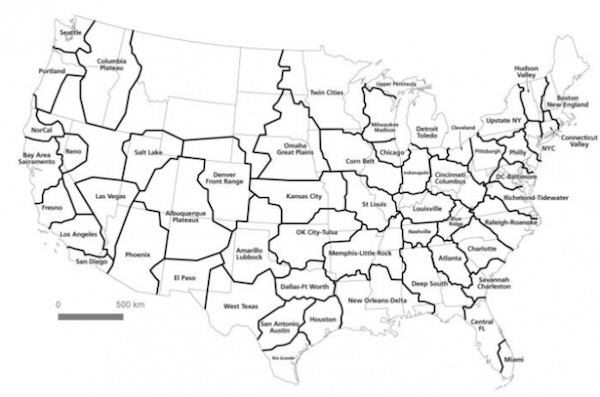

Tsipras needs to grow a pair.
• Greek Migration Ministry Running Out Of Options On Islands (Kath.)
The Migration Ministry appears to be at a dead end over how to manage the growing number of migrants trapped on the country’s eastern Aegean islands after an adverse court ruling on Chios and a clash with the mayor of Lesvos. On Chios, a magistrate on Monday upheld a complaint against the development of a holding facility for migrants exhibiting delinquent behavior, leaving the ministry with few options over how to separate troublemakers from the general population at the processing center in Souda, where violence has erupted on several occasions in the past few months.
On Lesvos, tensions rose during a meeting between Migration Minister Yiannis Mouzalas and Mayor Spyros Galinos on Sunday over the installation of portable toilets at the island’s harbor for migrants temporarily housed on a ship after their tents at Moria camp were snowed in last week, with the local official accusing Mouzalas of putting him on a collision course with the community. Mouzalas has sought – and largely failed – to muster support for building more camps on the islands to help ease the pressure on existing facilities that are struggling to accommodate tens of thousands of refugees and migrants, but is running into increasing opposition.

We are beyond shame and humanity. Beyond God.
• Second Man Dies On Freezing Migrant Route Near Turkey In Greece (AP)
Police in a region of Greece that borders Turkey say another person has died of hypothermia on a route used by migrant smugglers despite freezing temperatures. Authorities said the body of a man was discovered buried in snow outside a Greek village on Monday. They think he probably died over the weekend. The man was the second to succumb to the cold in less than two weeks. Another died of hypothermia in the same area on January 3. In a separate incident, a migrant man was being treated at a nearby hospital for symptoms of frostbite. Greek authorities have reported a recent surge in the number of people attempting to reach Europe while avoiding detention on the Greek islands by crossing a river that divides Turkey and Greece.









Home › Forums › Debt Rattle January 17 2017